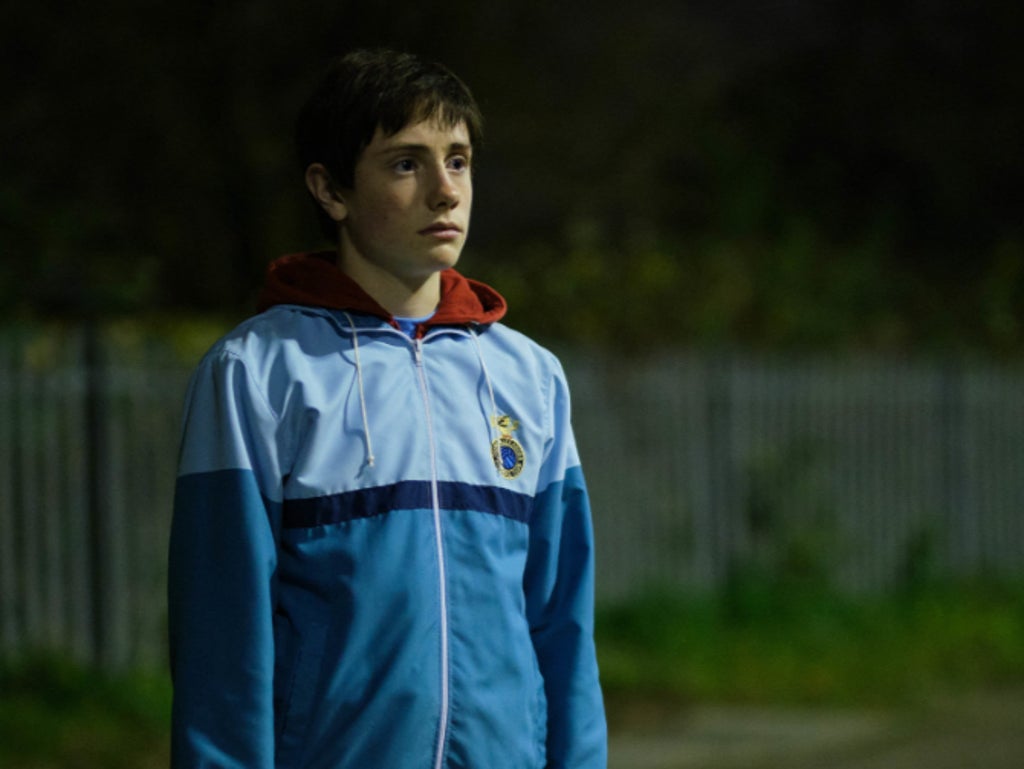
Floodlights is a harrowing watch, even if you allow for its subject matter: the sexual abuse of boys on an industrial scale by football coach Barry Bennell. For anyone with sensibility it will be, I’m afraid to say, all too much. Bennell was a prominent football scout and coach in the northwest from the 1970s to the 2000s; the full extent and detail of his crimes will probably never be known. Partly that’s because not all of those who may have been abused are still alive, but also because others, even now, wish to try to bury and forget their experiences. Currently serving a long prison sentence, Bennell was plainly a prolific offender.
One of his victims – and the focus of this dramatisation – was Andy Woodward. He was a young, highly talented defender that Bennell had talent-spotted for Crewe Alexandra in the 1980s, and who went on to be a successful professional player. Over the course of some years, he was treated as nothing more than a sexual slave by Bennell. Woodward is portrayed with an almost unbearable sense of loss by Max Fletcher as a teenager, and by Gerard Kearnes as a grown man. The cold, brutal details of Bennell’s crimes are brought home in the simple scene where the older Woodward, at last feeling able to speak to the police, lists the offences in legal terms in his damning witness statement, including French kissing, molestation, oral sex and rape on a daily basis. We obviously see no representation of these on screen; it is distressing enough to see Bennell (Jonas Armstrong) manipulating, threatening and bribing those children into his home and his bed. When we see Andy trembling as the naked Bennell gets into the bed, we know all too clearly what will happen next, though we don’t see it. It is chilling, and repulsive.
It was Woodward’s brave move that encouraged many others to come forward, exploited and injured physically and mentally by Bennell and many other abusers. It was, as the programme tells us in its opening caption, the darkest side of football, its biggest ever crisis and something that changed the game forever.
It also destroyed lives, something vividly captured in the drama’s more claustrophobic moments. We see how Woodward remains Bennell’s captive even when he grows up – “I feel like I’m trapped in his house, his bed, in his arms, in his mouth,” he says. Woodward’s professional career is cut short when the trauma catches up with him, and we see him turning to drink as his marriage collapses and he struggles to tell his hardworking, loving parents, Terry and Jean (Steve Edge and Morven Christie) the awful truth. The shame and trauma spread up and down the generations.
You might say Bennell was basically football’s answer to Jimmy Savile (soon to be the subject of a dramatisation with Steve Coogan in the lead role). Some of the grooming tactics used by Bennell and Savile were strikingly similar. As we see Bennell charming Terry and Jean Woodward and promising huge financial rewards for their son, we’re reminded of how Savile also made a point of visiting and cynically winning the trust of parents. We see Bennell the self-styled “star-maker”, showing off his power and his links with the glittering names of Liverpool, Manchester United and Manchester City. He dazzles these working class kids with his big money talk, Aladdin’s cave of space invader games, table football and a tank full of pet lizards. Jonas Armstrong is simply brilliant in the role, oozing arrogance and vanity, and replicating how a predatory and insatiable paedophile was able to operate “in plain sight”. He’s an evil, grinning apparition in a tracksuit, with a tan and a poodle perm.
In the drama, those around Bennell are either duped or choose to ignore what they suspect might be going on. He has no accomplice, but his ally was complacency. Much is still disputed, perhaps for reputational reasons, but surely some people with whom Bennell worked for decades must have wondered: why was an unmarried man living alone quite so keen on frequent sleepovers with groups of teenage boys? To the extent that his “favourites” were invited to share his bed (and always favoured in team selection)? Floodlights, sad to say, tells the story of only one of many wrecked lives, and does so all too movingly.







